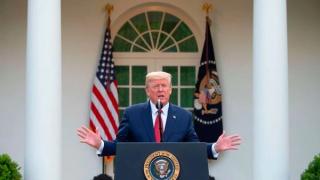President Trump's response to COVID-19 has been rambling, chaotic, and petty. Lagging rather than leading international efforts to fight the virus, the US is grappling with crippling deficiencies in its political and health systems. But there is one controversial aspect of Trump's crisis response that is on point.
In his often rambling and incoherent press conferences President Trump has meticulously labelled COVID-19 as the “Chinese virus". The phrasing is crude and clumsy. It’s most likely inflamed racists in America and elsewhere. But his instincts are right. A cannonade of Chinese Communist Party corona-propaganda is being coordinated across the globe. It’s vital that democratic nations stand up against it. That means, regrettably, while we fight this virus, we also need to sustain awareness of how China’s authoritarian system let the pandemic slip. Through this crisis, shielding democracies from the lure of techno-authoritarian state models like China’s will be a constant challenge. So too will be securing challenges to democracy at home.
Through this crisis, shielding democracies from the lure of techno-authoritarian state models like China’s will be a constant challenge. So too will be securing challenges to democracy at home.
In an analysis of Chinese government messages The New York Times concluded that a concerted effort is underway by the Chinese Communist Party to position China as the leading global power fighting the COVID-19 pandemic, highlighting positive aspects of the Chinese government’s response to the virus, and disputing that the virus originated from Wuhan, China. Official Chinese media sources and government spokespeople have asserted that the virus might have originated in Italy last November or the United States last September: some have fanned sinister online allegations that the US military was behind the spread of the virus.
But it was China’s authoritarian system that stymied initial global efforts to detect, contain, and treat COVID-19. Late last year Chinese authorities reprimanded and detained doctors raising alarm at the new virus and instead declared COVID-19 “preventable and controllable”. In the first three weeks of January, leading up to the peak travel period of the Chinese New Year holiday, Chinese Communist Party officials expanded online censorship – eventually directing that more than 500 keyword combinations relating to the virus be censored on social media platform WeChat.
The Wuhan Health Commission insisted there were no new cases of the sickness in the city during a month in which more than 2000 individuals took flights from Wuhan to Sydney. The reality was very different: one public health study concluding that had Chinese authorities acted three weeks sooner to declare what was known about the virus, global pandemic cases could have been reduced by 95 per cent.
While all countries must respond to this crisis together, and the virus could easily have originated in any of them, we must be clear that the pandemic was fanned by the constrictive politics and purposely opaque nature of China’s communist state.
Censorship and manipulation of information relating to disasters and public emergencies are tools of trade for communist regimes. Particularly China’s, which has mastered the art of state-controlled media propaganda. Even now whistleblowing Wuhan doctors are reporting that virus statistics from the city continue to be manipulated for political purposes. While all countries must respond to this crisis together, and the virus could easily have originated in any of them, we must be clear that the pandemic was fanned by the constrictive politics and purposely opaque nature of China’s communist state.
Now as Western countries grapple with the balance between transparency, individual liberty, and the need for decisive state action to suppress the pandemic, China seeks to showcase its own triumph. American analyst Richard Fontaine concludes that “Beijing’s preferred master narrative portrays a decisive, efficient, generous China that triumphs over disease at home and helps those still at risk abroad. It adds to that picture a plodding, declining United States that is flailing on the home front and inspiring little confidence elsewhere”. Some analysts go further, assessing that the Chinese government is planning now to disrupt the place of Western companies and countries in global supply chains post-pandemic.
International cooperation to fight this virus is critical and we should hope that last week’s G20 meeting shifts major global economies away from isolation and autarky and towards coordinated political, economic, and medical efforts to resolve this global crisis. But we must not be naive to the strategic competition playing out between communist China and democracies in the background. And we must guard against ignorantly mouthing the talking points of a dictatorial regime furiously rewriting recent history.
As Australians move to lockdown and focus on the core services necessary to sustain the lives of our citizens, our country could well start to feel a little more authoritarian too. Safeguarding our own democracy will be vital. Limiting the extraordinary powers we give our political leaders, appropriately scrutinising the way they are exercised, and reminding ourselves of the virtues of an open, accountable, and transparent political system will be the responsibility of every one of us.




